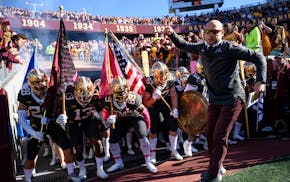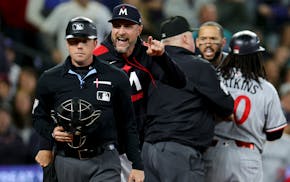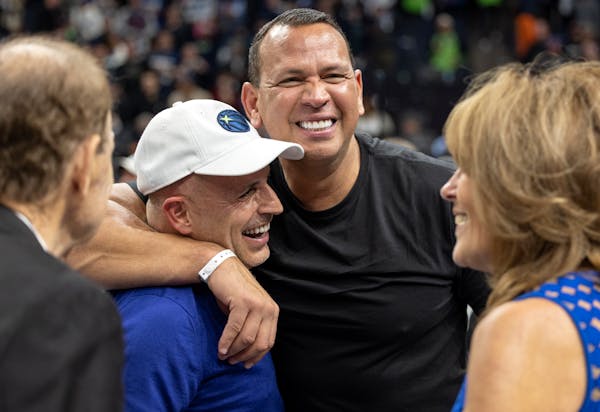The attempt by tech billionaire entrepreneur Marc Lore and former baseball star-turned-businessman Alex Rodriguez to acquire controlling ownership of the Minnesota Timberwolves and WNBA counterpart Minnesota Lynx from Glen Taylor will likely be settled by lawyers and potentially a judge.
Lore and Rodriguez were expected to make their third and final installment of a $1.5 billion payment to Taylor for the teams by March 27, giving them 80% ownership of the franchises. The next day, Taylor said in a statement that the option allowing the acquisition had expired.
Lore and Rodriguez said they secured the necessary funding for the deal and submitted the paperwork to the NBA on time. That deadline can be extended 90 days, they said, if the sides are awaiting league approval to finish the acquisition. Lore said he and Rodriguez would fight "with all means possible" to close the deal that would make them controlling owners of the teams collectively valued at $2.5 billion.
Wachtell, Lipton, Rosen & Katz, a New York law firm representing Lore and Rodriguez, declined to comment. Messages to attorneys representing Taylor were not immediately returned.
According to contract details revealed in the 2021 lawsuit against Taylor by a shareholder opposing the sale, the contract includes an arbitration clause, which states any dispute or controversy would be resolved by binding arbitration and would take place in Minneapolis. Any claim exceeding $5 million would be determined by a three-member arbitration panel.
Arbitration is a procedure for settling private disputes to avoid going to court, said Charles Reid, a University of St. Thomas law professor. A retired judge and lawyers will interpret whether an extension for the final installment was permitted under the rules of the contract between Purple Buyer Holdings LLC, the joint company owned by Lore and Rodriguez, and Taylor Sports Group, a company owned by Taylor, who also owns the Star Tribune.
"What it comes down to is, does Glen Taylor have a right to strict performance?" Reid said. "He's acting as if he does, and the question is whether he does in fact have an expectation of strict performance."
Under those terms, Lore and Rodriguez had to comply to exact expectations as described in the contract, "and you can't be late," Reid said.
Taylor says Lore and Rodriguez didn't fulfill necessary, contractual steps before March 27 and that the failure to meet the deadline is cause to terminate that part of the deal.
Lore and Rodriguez say Taylor's interpretation is wrong. They say the only dates that mattered were Dec. 31, when they notified Taylor of their intent to make the purchase, and March 27 , when they said they had the funding secured and paperwork submitted to the NBA.
"Do you want strict compliance with the contract terms or is there room for flexibility?" Reid said. "That's always the debate."
The 2021 lawsuit filed by a shareholder of the Timberwolves and Lynx against Taylor over the initial sale provided a window into the teams' ownership structure and how the deal was mostly structured. A section in the lawsuit addressed how parties were required to perform or comply at or before the closing, and "there seems to be an expectation here of strict compliance" Reid said after reading the contract.
"This will go to arbitration and the arbitration will be binding and that's how it finally gets resolved," he said.
Before beginning arbitration, both sides are asked to resolve any dispute by first "using a mediator agreed to by the parties," according to the agreement. It also says no arbitration demand "may be filed until the parties have completed the mediation."
Lore and Rodriguez said they secured financing for the deal, and if that funding came from investors, they are obligated to make their investors whole, Reid said. The two wouldn't be able to sue Taylor for blocking their effort to make investors whole because he asserts there was a time limit they didn't comply with, he added.
If a ruling finds Lore and Rodriguez missed the deadline for the option to acquire controlling interest of the teams, there could still be a path to own more shares, according to the founder of a U.S. firm specializing in investments in professional sports teams.
The person spoke under the condition of anonymity given the unresolved Timberwolves dispute and position in the industry.
It's not uncommon, he said, for shareholders to have the right for first refusal in acquiring more shares if they become available, he said.

Two offensive tackles, linebacker are first to commit to Gophers in 'Summer Splash' weekend

Twins' Correa ejected from on-deck circle, and he's not really sure why

Neal: Girma returns to United States national team and rewards fans with her classiness

Twins' inability to score in extra innings costly in wild loss at Seattle

